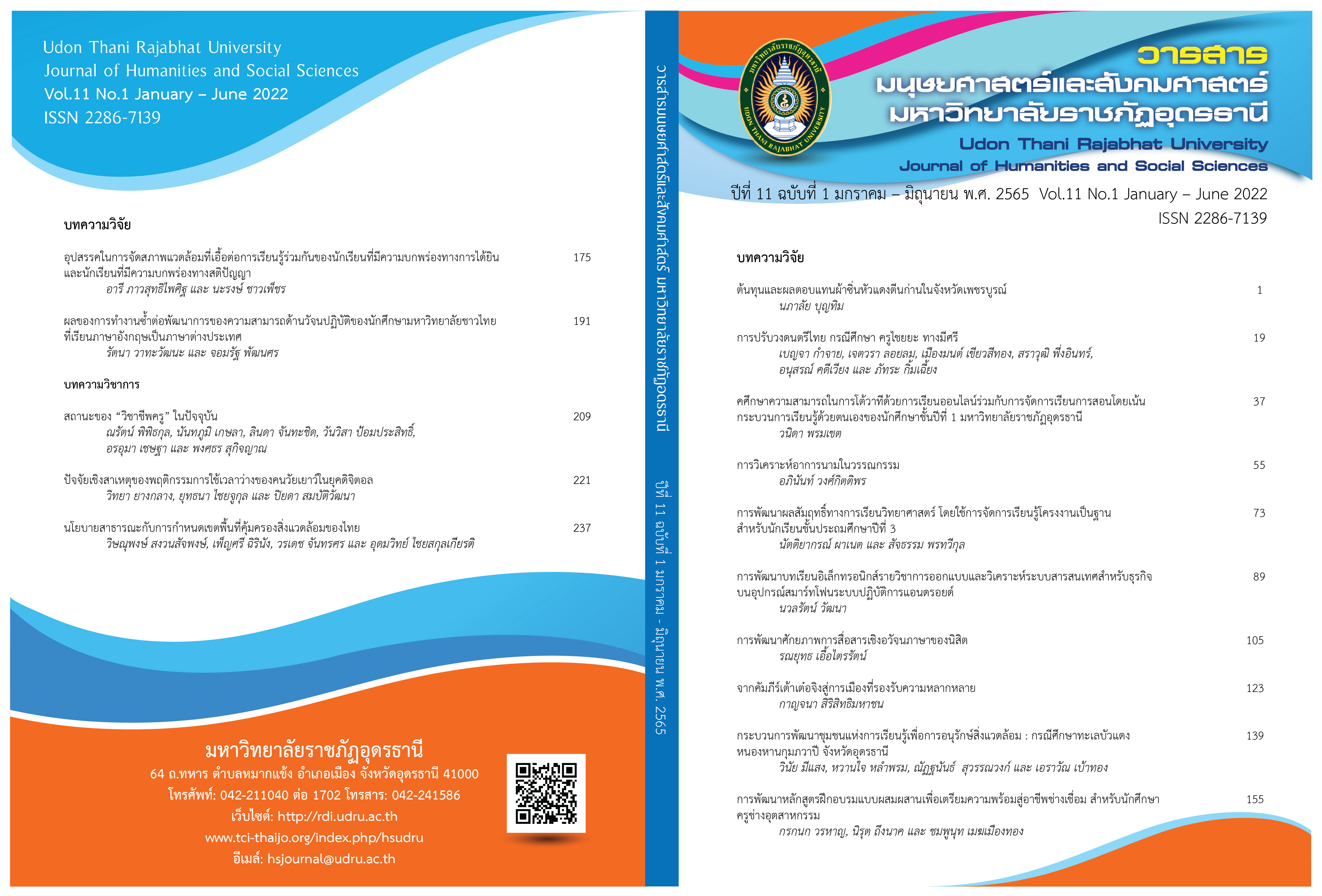ผลของการทำงานซ้ำต่อพัฒนาการของความสามารถด้านวัจนปฏิบัติของนักศึกษามหาวิทยาลัยชาวไทยที่เรียนภาษาอังกฤษเป็นภาษาต่างประเทศ
Main Article Content
บทคัดย่อ
งานวิจัยนี้แสดงถึงผลการศึกษาผลของการทำงานซ้ำต่อพัฒนาการของความ สามารถด้านวัจนปฏิบัติของนักศึกษาชาวไทยวิชาเอกภาษาอังกฤษจำนวน 101 คน โดยมีกลุ่มทดลองจำนวน 2 กลุ่ม คือกลุ่ม IR และ TR หัวข้อเรื่องการตำหนิ ร้องเรียนด้วยวิธี การทำงานซ้ำ (Task repetition) ทั้งเนื้อหาและกระบวนการเดิม (IR) และแบบทำงานซ้ำในรูปแบบเฉพาะกระบวนการเดิมแต่ใช้เนื้อหาที่ต่างกันในแต่ละครั้ง (TR) ส่วนกลุ่มควบคุมเป็นแบบชั้นเรียนปกติ ทั้งนี้กลุ่ม IR และ TR ได้รับการสอนสัปดาห์ละ 2 ครั้ง โดยทำแบบทดสอบก่อนเรียน รับการสอนแบบ IR และแบบ TR ตามกลุ่ม แล้วทำแบบสอบถามวัดทัศนคติและแบบทดสอบหลังเรียน ส่วนกลุ่มที่เรียนแบบปกติทำงานเพียงครั้งเดียวแล้วทำแบบทดสอบหลังเรียน ผลของการศึกษาพบว่า การเรียนแบบทำงานซ้ำทั้งสองรูปแบบสามารถส่งเสริมให้ผู้เรียนมีพัฒนาการด้านวัจนภาษาในการตำหนิ ร้องเรียนดีขึ้นอย่างมีนัยสำคัญที่ระดับ .05 และยังมีทัศนคติในเชิงบวกต่อการทำงานซ้ำอีกด้วย
Article Details
เอกสารอ้างอิง
Ahmadi, H., & Ghaemi, F. (2017). Effects of Task Repetition and EFL Proficiency on English Speech Act Production. Arab World English Journal (AWEJ), 8(1), 179-193.
Ahmadian, M. J. (2011). The effect of ‘Massed’ Task Repetitions on Complexity, Accuracy and Fluency: Does It Transfer to a New Task?. The Language Learning Journal, 39(3), 269–280.
Austin, J. L. (1962). How to Do Things with Words. 2nd ed. Cambridge, MA: Harvard University Press.
Bachman, L. F. (1990). Fundamental Considerations in Language Testing. Oxford: Oxford University Press.
Baleghizadeh, S., & Derakhshesh, A. (2012). The Effect of Task Repetition and Noticing on EFL Learners' Oral Output. International Journal of Instruction, 5(1), 141-152.
Brown, P., & Levinson, S. C. (1987). Politeness: Some Universals in Language Usage. Cambridge: Cambridge University Press.
Bygate, M. (1996). Effects of Task Repetition: Appraising the Developing Language of Learners. In J. Willis & D. Willis (Eds.), Challenge and Change in Language Teaching (pp. 136-146). Oxford: Heinemann.
Bygate, M. (2001). Effects of Task Repetition on the Structure and Control of Oral Language. In M. Bygate, P. Skehan, & M. Swain (Eds.), Researching pedagogic tasks: Second language learning, teaching and testing (pp. 23-48). Harlow: Longman.
Bygate, M., & Samuda, V. (2005). Integrative Planning through the Use of Task Repetition. In R. Ellis (Ed.), Planning and Task Performance in a Second Language (pp. 37-74). Amsterdam: John Benjamins.
Ellis, R. (2003). Task-Based Language Learning and Teaching. Oxford: Oxford University Press.
Ellis, R. (2005a). Planning and Task Performance in a Second Language. Amsterdam: John Benjamins.
Ellis, R. (2005b). Planning and Task-based Performance: Theory and Research. In R. Ellis (Ed.), Planning and Task Performance in a Second Language (pp. 3-36). Amsterdam: John Benjamins.
Hawkes, M. (2011). Using Task Repetition to Direct Learner Attention and Focus on Form. ELT Journal, 66, 327-336.
Inprasit. C. (2016). Thai Native Teachers’ Experiences of Using Communicative Language Teaching in Extended Education Schools. Master Thesis in Teaching English as Foreign Language, Thammasat University.
Lynch, T., & Maclean, J. (2000). Exploring the Benefits of Task Repetition and Recycling for Classroom Language Learning. Language Teaching Research, 4(3), 221-250.
Lynch, T., & Maclean, J. (2001). A Case of Exercising: Effects of Immediate Task Repetition on Learners’ Performance. In M. Bygate, P. Skehan, & M. Swain (Eds.), Researching pedagogic tasks: Second language learning, teaching and testing (pp.141–162). Boston: Addison Wesley Longman.
Morris, K. J. (2017). Learning by Doing: The Affordances of Task-Based Pragmatics Instruction for Beginning L2 Spanish Learners Studying Abroad. Ph.D. Dissertation, University of California.
Moser, J. (2012). A Classroom Based, Mixed Methods Study into the Influence of Transcribing, Reporting, and Task Repetition: How do they impact in-class student spoken task performances. Ph.D. Dissertation, University of Birmingham.
Nakhle, M., Naghavi, M., & Razavi, A. (2014). Complaint Behaviors among Native Speakers of Canadian English, Iranian EFL Learners, and Native Speakers of Persian (Contrastive Pragmatic Study). Social and Behavioral sciences, 98, 1316-1324.
Patanasorn, C. (2010). Effect of Procedural Content and Task Repetition on Accuracy and Fluency in an EFL Context. Ph.D. Dissertation, Northern Arizona University.
Pinto, D. (2002). Perdóname, ¿llevasmuchoesperando? Conventionalized Language in L1 English and L2 Spanish. Ph.D. Dissertation, Department of Spanish, University of California.
Searle, J. R. (1969). Speech acts: An Essay in the Philosophy of Language. Cambridge: Cambridge University Press.
Taguchi, N. (2009). Pragmatic Competence (Mouton Series in Pragmatics). Berlin: Mouton de Gruyter.
Takimoto, M. (2012). Assessing the Effects of Identical Task Repetition and Task Type Repetition on Learners' Recognition and Production of Second Language Request Downgraders. Intercultural Pragmatics, 9(1), 71-96.
Trosborg, A. (1995). Interlanguage Pragmatics: Requests, Complaints and Apologies. Berlin: Mouton de Gruyter.


